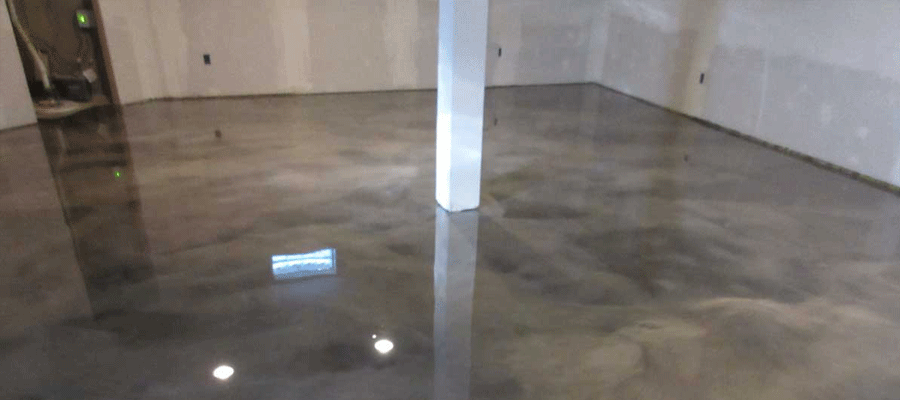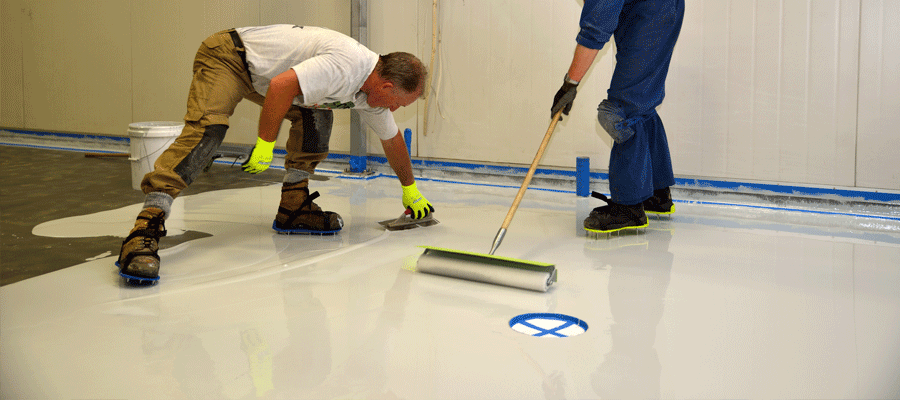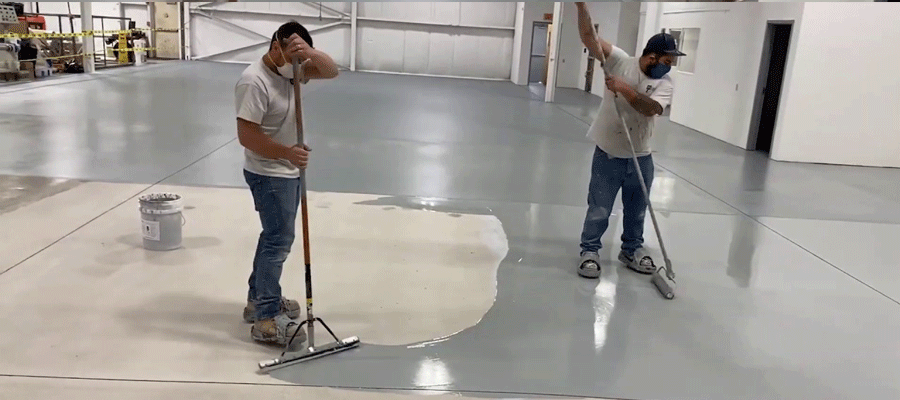If you are considering an epoxy flooring installation, you will not only have to choose the type of epoxy that you want but also whether you will do the installation yourself in a DIY kit or hire an epoxy contractor for the job.
When deciding between doing it yourself and hiring a professional, there are many factors that need to be considered. This article will discuss the pros and cons of both options, what sort of project is done with each option, how much work is involved, and who benefits most from each choice.
What Is Epoxy Flooring?
Epoxy floors are very durable coatings composed of two components: resin (the solid) and hardener (the catalyst). The materials are mixed together when they are applied to produce a chemical reaction that binds these two chemicals into a solid. The result is an extremely tough surface that is impervious to most types of damage and stains.
Epoxy flooring is sometimes referred to as “concrete on steroids” because it provides the durability of concrete with greater resistance to scuffs, scratches, heat, humidity, water, oil, corrosion, and electricity. It is very common in commercial kitchens for this reason.
Working With an Epoxy Contractor: Learn the Facts

When a professional install your epoxy, they will have to take all of the following steps:
• The contractor will have to drill holes in concrete areas for electrical floor boxes. In addition, they might need to add steel angles or metal strips where necessary.
• After drilling, the contractor will use a bonding agent or primer to ensure that the substrate is properly prepared before applying the epoxy resin and hardener. The bond ensures that no weak points are present on the surface, which could result in a crack later on.
• If applicable, expansion joints will be inserted into a concrete slab before installation begins. These can be made from polyurethane foam with an acrylic insert that is typically shaped like an hourglass (to avoid trapping water).
• Epoxy resin and hardener will be poured onto the floor. The contractor will usually use a squeegee or roller to ensure that the entire concrete surface is evenly coated and there are no air bubbles in the epoxy.
• After pouring, ultraviolet light will be used to accelerate curing for floors that need immediate installation (poor weather conditions could cause them to dry too slowly). For most types of epoxy, it will take one day for each quarter-inch of thickness to cure fully. This means that four inches of epoxy can take up to four days to completely dry and be ready for foot traffic. If you plan on installing an epoxy coating yourself, this type of wait time should definitely not be overlooked.
• Finally, for most types of commercial installations, the contractor will apply a clear topcoat that forms a glossy surface and protects the epoxy coating from scuffs and scratches. This is often omitted in residential applications (unless there is high foot traffic or pets).
Contractors will usually use an epoxy kit that includes all of these components plus the tools required to do the job, such as roller pans, mixing pads, and squeegees.
Working With an Epoxy Kit: Pros & Cons

When it comes to installing epoxy flooring at home, DIY kits are available online and in many home improvement stores. In comparison to a contractor, the benefits here are that it is often less expensive and allows the homeowner to take on a project themselves which can provide a sense of accomplishment. The downsides, however, include needing more time and effort as well as taking a risk by not having a professional install epoxy flooring. Here are some other facts about epoxy kits:
• There should be instructions included with every kit for any specific requirements that your surface might have (like needing acid to etch for concrete). If you’re unsure, always contact the manufacturer before starting.
• Working with epoxy requires strict adherence to safety standards such as wearing gloves at all times and keeping children away from the work area until installation is complete.
• For a garage or shop, DIY-grade epoxy should never be used as it is too slippery for safe use on hard surfaces. In addition, these low-quality epoxy materials do not provide the type of traction that you need in these areas (like rubber mats).
DIY kits usually come with prepackaged components that are measured out to create an even mixture. This means that most people will also need to purchase stir sticks and protective goggles if they don’t already own them. If the job is handled properly with all safety precautions taken, there is less risk than working directly with hazardous chemicals. However, it can still be more dangerous than using an epoxy contractor.
The main difference between choosing to work with an epoxy contractor versus using an epoxy DIY kit is that the contractor’s sole focus becomes your project. This means that they understand your individual goals, requirements, time constraints, and, most importantly, safety standards. If you plan on working with chemicals (of any kind), expertise in these areas can be invaluable when it comes to ensuring a lasting flooring solution.
Epoxy Contractors: What You Should Look For

When choosing an epoxy company to install epoxy at your home or business, there are some things that you should look for in order to ensure the best possible service and result. Some qualities of a good epoxy contractor include:
• Experience – Check how long they’ve been in the industry as well as what types they typically handle (residential, commercial, industrial, etc.). When it comes to epoxy coating installation, the more experience they have, the better.
• References – Ask if you can speak with some previous clients in order to get an idea of what type of quality to expect when working with this contractor. Additionally, these individuals will likely be able to provide insight into pricing and any additional costs that might not be included in their initial estimate (like needing acid for concrete).
• Insurance – Make sure that the contractor has adequate insurance policies in place, including liability coverage as well as worker’s compensation. This should always be up-to-date. Otherwise, there is a risk of getting held liable for any injuries or damages.
When it comes time to install your epoxy flooring, you can rest assured knowing that your contractor is using the best quality products and understands all of the safety precautions involved. Their expertise will provide a lasting surface that looks beautiful and performs as it should.
As with any project, there are pros and cons to using a professional epoxy contractor for installation versus using an epoxy DIY kit. Both have their own unique advantages depending on your needs while also taking into account safety concerns. If you’re looking to create the best possible environment for yourself or your employees, it is important that you understand all of your options in order to make an informed decision.
